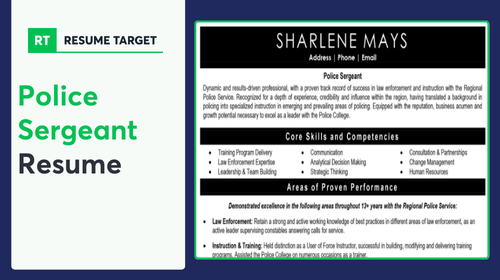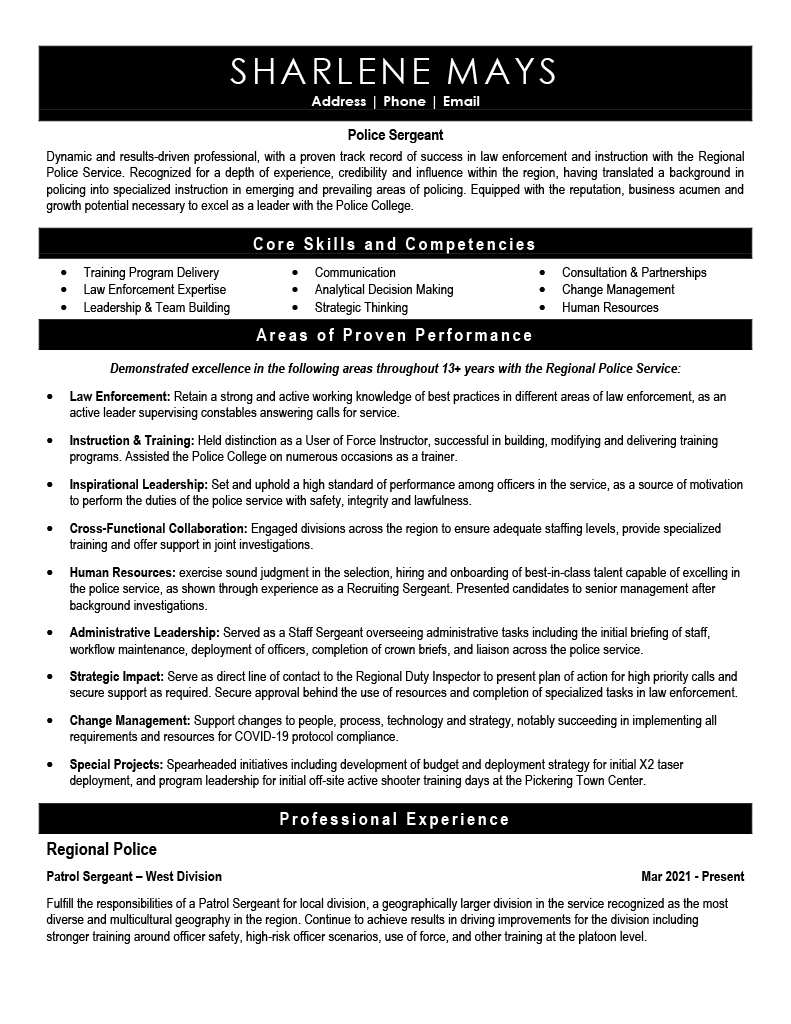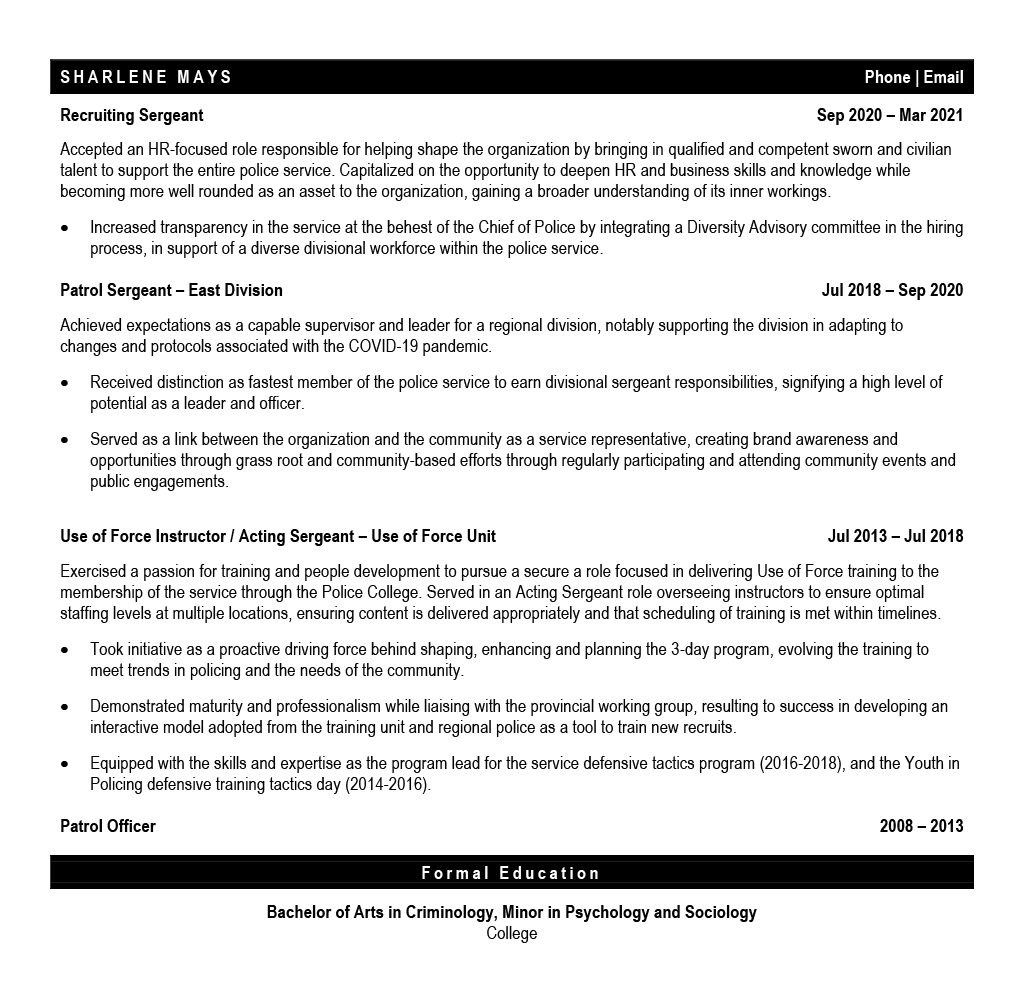

Leading a police unit takes strength, but capturing that leadership on paper stumps many sergeants. Your daily impact on public safety and team performance deserves more than a basic list of duties.
Are you struggling to translate your command experience into civilian-friendly terms? A well-crafted resume can showcase your leadership skills and operational successes in ways that grab attention from law enforcement hiring managers.
Resume Target specializes in helping police sergeants demonstrate their true value. We know how to present your tactical expertise, team leadership, and public safety achievements in language that connects with both law enforcement and civilian employers.


As the vital bridge between patrol officers and upper management, Police Sergeants serve as first-line supervisors who are responsible for getting the job done through others, transforming departmental policies into effective street-level law enforcement while maintaining high professional standards.
In this leadership role, you'll wear multiple hats - from mentoring junior officers and coordinating patrol operations to handling critical incident responses and ensuring your team maintains procedural compliance while serving the community with distinction.
Whether you're currently a patrol officer looking to advance or already serving as a Sergeant seeking to enhance your leadership skills, understanding the career progression and specialized training opportunities available to law enforcement supervisors can help you chart your course toward higher ranks in police administration.
Let's talk about what's exciting in the Police Sergeant career path! Your dedication to public service and leadership in law enforcement can lead to compelling earning potential. As you advance through the ranks, your expertise and responsibilities grow, directly impacting your compensation potential. And guess what? Location, specialization, and your accumulated experience can significantly boost your earning power.
Figures from: ZipRecruiter
Advancing from patrol officer to sergeant requires strategic career planning and continuous skill development. Your path to leadership in law enforcement combines hands-on experience, specialized training, and proven supervisory capabilities.
Beyond basic law enforcement skills, advancing to sergeant requires mastery of leadership capabilities and specialized tactical knowledge.
- Incident Command System (ICS) proficiency - Advanced investigative techniques - Critical incident management - Team leadership and mentoring abilitiesTo become a Police Sergeant, you'll typically need to start as a patrol officer, gain 3-5 years of experience, and demonstrate leadership abilities while completing required promotional exams and training.
To build your path toward becoming a sergeant, you'll need to develop key competencies including effective communication, organizational skills, and tactical expertise from field assignments that demonstrate your leadership potential.
Requirements from Zippia
From coast to coast, police departments are actively recruiting sergeants, with the highest demand in populous states.
Figures from U.S. Bureau of Labor Statistics
Struggling to translate years of law enforcement leadership, tactical operations, and team management into a compelling police sergeant resume that stands out from other candidates? This comprehensive, section-by-section guide will show you exactly how to showcase your command experience, supervisory skills, and public safety achievements in a format that hiring departments are looking for.
As a Police Sergeant who excels at leading teams and protecting communities, you might find it challenging to condense years of critical law enforcement experience into a few powerful lines.
While you're skilled at writing detailed incident reports and managing complex situations, translating your leadership abilities, tactical expertise, and departmental achievements into a compelling summary requires a different approach that helps hiring managers quickly recognize your command presence and supervisory capabilities.
How would you characterize your leadership approach in managing patrol officers and maintaining public safety across your jurisdiction?
Reason: This helps frame your overall management philosophy and establishes your authority level, which is crucial for a sergeant's role. It sets the tone for how you approach the fundamental responsibilities of the position.
What would you say are the most significant ways you've influenced departmental operations and law enforcement standards throughout your career?
Reason: This question helps you articulate your broad impact on organizational effectiveness and professional standards, which is essential for demonstrating leadership value in a summary statement.
How do you balance tactical police operations with community relations and officer development in your role as a Police Sergeant?
Reason: This helps you articulate your comprehensive approach to modern policing, showing potential employers that you understand the multi-faceted nature of sergeant-level leadership in today's law enforcement environment.
As a Police Sergeant, your resume needs to demonstrate both leadership capabilities and hands-on law enforcement expertise, from tactical team supervision to departmental policy implementation.
Your skill set should reflect a balance between command-level responsibilities like squad deployment and shift scheduling, alongside crucial operational abilities such as emergency response coordination and investigative oversight.
Note: Would you like me to continue with additional sections or specific skill examples for a Police Sergeant resume?Showcase your law enforcement leadership experience by organizing your work history into three powerful sections: a commanding role overview that highlights your supervisory scope, measurable achievements that demonstrate your impact on public safety and team performance, and core responsibilities that reflect your tactical and administrative expertise.
Many Police Sergeants struggle to translate their daily leadership and tactical decisions into compelling achievements that resonate with command staff and hiring authorities. Transform your patrol supervision and team management experience into powerful metrics that showcase reduced response times, improved clearance rates, and enhanced community safety outcomes.
A Police Sergeant's responsibilities section demonstrates leadership abilities and law enforcement expertise beyond basic patrol duties. Your role needs to be clearly communicated to show how you maintain public safety while managing officers and coordinating with other departments.
Your law enforcement credentials and specialized training are crucial for demonstrating your qualifications as a Police Sergeant. Focus on listing your most advanced certifications first, including POST certifications, tactical training, and any relevant degrees in Criminal Justice or Law Enforcement Administration.
Now that you've built a strong foundation using Resume Target's proven resume writing guidelines, you're ready to transform your basic resume into a powerful career advancement tool.
While many law enforcement professionals focus solely on customizing their cover letters, tailoring your Police Sergeant resume for each department and position you apply to is equally crucial for demonstrating your leadership capabilities and specific qualifications.
A customized resume helps you navigate through automated applicant tracking systems by incorporating relevant keywords, while also showing hiring commanders exactly how your experience, achievements, and leadership style align with their department's specific needs and culture.
Ready to outrank the competition? Let's transform your resume into a tactical advantage that proves you're the commanding presence they're looking for!
Starting fresh in law enforcement? Your path to becoming a Police Sergeant can begin with a strong entry-level resume.
While you may not have direct supervisory experience, your combination of education, academy training, and demonstrated leadership skills from other roles can make a compelling case for your potential.
Focus your resume on highlighting your leadership abilities, knowledge of law enforcement procedures, and any relevant training or certifications.
For detailed guidance on structuring your resume, check out the Student Resume Writing Guide to ensure you're presenting your qualifications in the best possible light.
Your resume summary is your chance to showcase your leadership potential, specialized law enforcement training, and commitment to public service, even if you're just starting your supervisory journey.
Focus on highlighting your patrol experience, tactical training achievements, and demonstrated leadership qualities that make you ready for sergeant responsibilities.
"Dedicated and results-driven law enforcement professional with 5+ years of patrol experience and distinguished performance in tactical operations and team leadership. Completed Advanced Leadership Training with top honors while maintaining exceptional arrest and case closure rates. Demonstrated success in mentoring junior officers and coordinating multi-unit responses. Seeking to leverage proven leadership abilities and operational expertise in a Police Sergeant role to enhance departmental effectiveness and community safety."
Now's your chance to showcase the extensive training and specialized education that sets you apart as a law enforcement leader!
Don't just list your police academy graduation - highlight your advanced certifications, leadership training programs, and specialized coursework in areas like tactical operations, crisis management, and departmental supervision that demonstrate your readiness for sergeant responsibilities.
unavailableRelevant Coursework: Criminal Justice Administration | Police Tactics and Procedures | Constitutional Law | Emergency Response Management | Leadership and Supervision | Crisis Intervention
Key Projects:
Community Policing Initiative Development: Designed and implemented a comprehensive community outreach program focusing on building trust between law enforcement and local neighborhoods while reducing crime rates through preventative measures.
Tactical Response Training Program: Led the development of an enhanced tactical response training curriculum for junior officers focusing on both physical skills and decision-making processes.
Leverage your law enforcement experience, leadership training, and specialized certifications to create a compelling skills section that showcases your readiness to lead and mentor fellow officers while maintaining public safety standards.
As an aspiring Police Sergeant, your demonstrated combination of tactical expertise and leadership capabilities positions you well for advancement in law enforcement, where skilled supervisors are consistently in demand to guide and develop effective police units.
When you've dedicated your career to protecting and serving others, it can feel challenging to turn around and promote yourself on paper - especially when you need to translate years of public service and leadership into civilian-friendly terms.
At Resume Target, we specialize in helping law enforcement professionals showcase their command experience and public service impact in ways that resonate with police department hiring panels.
Our expert writers have helped countless sergeants highlight their tactical expertise, leadership capabilities, and community impact in ways that consistently lead to promotions and new opportunities.
With police departments across the country actively recruiting experienced leaders, now is the perfect time to ensure your resume reflects your true capabilities - let's connect today to craft your standout sergeant resume.
Impress any hiring manager with our Government resume writing service. We work with all career levels and types of Government professionals.
Learn More → Government Resume Writing Services